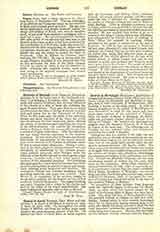

Conradin of Bornada (or OF BRESCIA), Dominican preacher, b. in the latter part of the fourteenth century; d. at Bologna, November 1, 1429. His parents, noble and wealthy Brescians, were devoted adherents of the Church in a time of many ills, including the great Western Schism. They gave their son a careful education and sent him, at the age of sixteen, to study civil and canon law at the University of Padua. There for five years amid the perils of the unbridled licence and moral disorders of the times, the youth was conspicuous for both talent and virtue, winning the esteem of his masters and compelling the respect of his fellow-students. He entered the Dominican Order at Padua in 1419, and was speedily found to be a model of religious observance. After his ordination his zeal found fruitful expression in his eloquent preaching. He was made prior of Brescia and shortly afterwards, by appointment of the master general, prior of the convent of St. Dominic at Bologna, where he was to restore strict observance. During a visitation of the black plague he displayed heroic zeal and intrepidity in ministering to the stricken people. Amid political upheavals, when Bologna under the influence of the Bentivogli had revolted against papal authority, Conradin took a firm stand against the conduct of the misguided populace. For publishing the papal interdict, which they had incurred but which they had disregarded, he was twice seized and imprisoned, suffering many indignities and cruelties. His courageous bearing and constant mediation finally prevailed, however, and peace was restored. Pope Martin V, in recognition of his services, sought to create him a cardinal, but the humble servant of God resolutely declined the honor. The plague breaking out anew, Conradin fell a victim to his charity and died in the midst of his heroic ministrations. His early biographers generally refer to him as Blessed.
JOHN R. VOLZ

